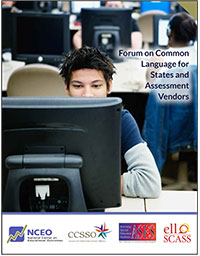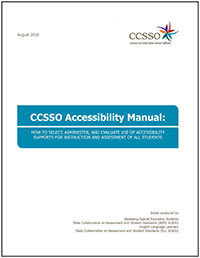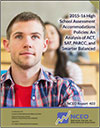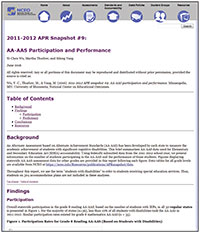Welcome
Fall is definitely in the air, and school is well underway! This October issue of NCEO’s e-newsletter highlights the news of NCEO’s continued funding. It also summarizes several new reports. These include a report on the pre-session to the National Conference on Student Assessment, a forum on Common Language for States and Assessment Vendors. Consistent with the need for common language is the Accessibility Manual developed through the Council of Chief State School Officers. Information on the contents and tools in this new manual is provided here, along with links to the manual that is available to all states to adapt as desired. Another report highlighted here is the recent NCEO report that examines high school assessment accommodation policies of ACT, SAT, PARCC, and Smarter Balanced; this report raises issues of differences in policies and procedures that are likely to affect many students with disabilities. Finally, in this issue we highlight recent snapshot reports of assessment and accommodations data submitted by states’ special education divisions to the U.S. Department of Education. These snapshots highlight assessment participation, use of accommodations, and performance on assessments. Enjoy!
– Martha Thurlow, NCEO Director
NCEO Work to Continue and Expand!
 NCEO has been awarded a five-year grant by the U.S. Department of Education, Office of Special Education Programs, to continue its work as a national technical assistance center. Starting October 1, 2016, NCEO’s knowledge development and technical assistance activities focus on increasing the participation and improving the results of students with disabilities on state and districtwide assessments.
NCEO has been awarded a five-year grant by the U.S. Department of Education, Office of Special Education Programs, to continue its work as a national technical assistance center. Starting October 1, 2016, NCEO’s knowledge development and technical assistance activities focus on increasing the participation and improving the results of students with disabilities on state and districtwide assessments.
Forum on Common Accessibility Language for States and Assessment Vendors

With the paradigm shift away from providing only accommodations to instead providing three or more tiers of accessibility features that include a variety of accessibility supports and different ways of executing and labeling them, educators, parents, and students may be confused by the differences in terminology from one assessment to the next.
On June, 20, 2016, NCEO, the Assessing Special Education Students (ASES) State Collaborative on Assessments and Student Standards (SCASS), and the English Language Learners (ELL) SCASS held a joint forum on the need for common accessibility language across assessment platforms.
New CCSSO Accessibility Manual
 An accessibility manual was recently published by the Council of Chief State School Officers (CCSSO). It establishes guidelines for states to use for the selection, administration, and evaluation of accessibility supports for instruction and assessment of all students, including students with disabilities, English learners (ELs), ELs with disabilities, and students without an identified disability or EL status.
An accessibility manual was recently published by the Council of Chief State School Officers (CCSSO). It establishes guidelines for states to use for the selection, administration, and evaluation of accessibility supports for instruction and assessment of all students, including students with disabilities, English learners (ELs), ELs with disabilities, and students without an identified disability or EL status.
The High School Accommodations Policies of ACT, SAT, PARCC, and Smarter Balanced
 NCEO recently published a new report on high school accommodations policies, 2015-16 High School Assessment Accommodations Policies: An Analysis of ACT, SAT, PARCC and Smarter Balanced. Many students with disabilities and ELs use accommodations to access the ACT, SAT, PARCC, and Smarter Balanced assessments. This report analyzes differences in the accessibility framework, decision-making process, and terminology across the four assessments.
NCEO recently published a new report on high school accommodations policies, 2015-16 High School Assessment Accommodations Policies: An Analysis of ACT, SAT, PARCC and Smarter Balanced. Many students with disabilities and ELs use accommodations to access the ACT, SAT, PARCC, and Smarter Balanced assessments. This report analyzes differences in the accessibility framework, decision-making process, and terminology across the four assessments.
Dig into the APR Data Using NCEO’s Data Snapshots
 States annually report through an Annual Performance Report (APR) on their progress toward meeting the targets in their State Performance Plan (SPP). NCEO recently published several APR Snapshots that use 2013-14 APR data to look at how students with disabilities are included in assessments used for Elementary and Secondary Education Act (ESEA) accountability.
States annually report through an Annual Performance Report (APR) on their progress toward meeting the targets in their State Performance Plan (SPP). NCEO recently published several APR Snapshots that use 2013-14 APR data to look at how students with disabilities are included in assessments used for Elementary and Secondary Education Act (ESEA) accountability.
NCEO’s National Assessment Center is supported through a Cooperative Agreement (#H326G110002) with the Research to Practice Division, Office of Special Education Programs, U.S. Department of Education. The Center is affiliated with the Institute on Community Integration at the College of Education and Human Development, University of Minnesota. The contents of this report were developed under the Cooperative Agreement from the U.S. Department of Education, but do not necessarily represent the policy or opinions of the U.S. Department of Education or Office within it. Readers should not assume endorsement by the federal government.
